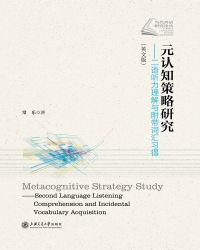1.2 Place of Listening Instruction in College English Courses in China
您可以在百度里搜索“元认知策略研究:二语听力理解与附带词汇习得(英文版) 艾草文学(www.321553.xyz)”查找最新章节!
1.2 Place of Listening Instruction in College English Courses in China
That most Chinese EFL learners' listening ability is weak in comparison to other skills such as reading and writing is, to some extent, related to the fact that in China the instructional emphasis is unbalanced so the students are not able to develop all the language skills equally. In the past, Chinese students were traditionally taught to read and write in English so that they could understand English materials in the fields of their future careers. From the perspective of the students, listening was viewed as a passive process of merely listening to a text and then finishing the after-listening questions. From the perspective of the teachers, the approach adopted focused more on the product of listening than the process. It was assumed that listening skills would develop automatically if other skills were improved to a desirable level and therefore classroom instruction on listening was unnecessary. As a result, listening activities remained virtually a test of comprehension, and listening comprehension became a skill in which Chinese students often felt they had achieved the least. “Such attributions indicate a sense of passivity and helplessness in language learners which could easily result in their becoming demotivated, resigned to being less effective listeners” (Graham, 2006). In such circumstances, offering language learners more listening activities would most likely only add to their sense of failure.
Only in the last decade has listening begun to be acknowledged in its own right in EFL education in China. The Course of College English in Chinese universities underwent a nation-wide reform in 2007 with the publication of the Chinese Education Ministry's College English Curriculum Requirements, which pointed out that “the objective of College English is to develop students' ability to use English in an all-round way, especially in listening and speaking, so that in their future studies and careers as well as social interactions they will be able to communicate effectively” (p.18). The requirements for undergraduate College English teaching are set at three levels—the basic level, the intermediate level and the advanced level, and the requirements for listening of the three levels are shown in Table 1.
Table 1 The Requirements for Listening at the Three Levels
(Source: College English Curriculum Requirements, p.19-22)
Though the role of listening is now recognized as important in Chinese university EFL teaching, listening instruction, with only an average teaching time of 12-14 hours in each term, is by no means adequate to help students develop the competence needed to comprehend languageinspoken form. Thereis, todate, still a gapbetweenthe requirements for listening and the teaching of listening in China. Among the major problems concerning the teaching of listening in Chinese universities, the two most significant are:
(a) To most EFL teachers in China, teaching listening is still confined to first playing a recording of a listening text, then checking the students' answers, and finally informing them of the correct answers. Such instructional methods as repetition, schema-raising, and strategy training are seldom employed and probably never heard of by some EFL teachers. In fact, instruction in the use of listening strategies only began in the last decade and strategies for developing metacognitive awareness have been largely neglected. The effects of metacognitive listening strategy training on Chinese EFL learners' listening comprehension have been little studied and little is known about the relationship between the learners' metacognitive listening awareness and their listening comprehension.
(b) As a major component of listening input, vocabulary is of primary importance to Chinese EFL learners' listening comprehension. Also incidental vocabulary acquisition through listening is a promising source of new vocabulary for Chinese university EFL learners. Nevertheless, incidental acquisition of vocabulary through listening by Chinese learners has hardly been researched in China, neither has the relationship between Chinese learners' EFL vocabulary acquisition andtheir metacognitive awareness. 元认知策略研究:二语听力理解与附带词汇习得(英文版)

